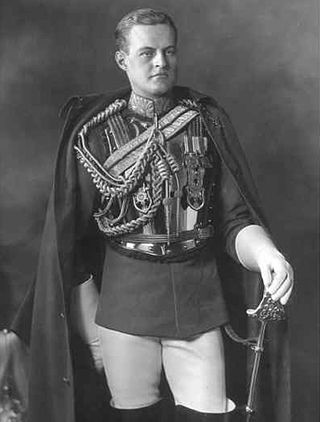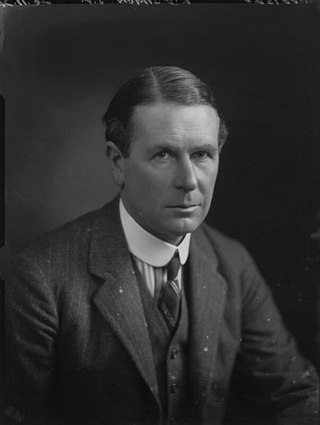Notes
This article needs additional citations for verification .(September 2014) |
- 1 2 "No. 37872". The London Gazette . 4 February 1947. p. 613.
- ↑ Barony of Simon of Wythenshawe in the Peerage of the United Kingdom. House of Lords
- ↑ Roll of Peerage
Baron Simon of Wythenshawe, of Didsbury in the City of Manchester, is a title in the Peerage of the United Kingdom. [1] It was created in 1947 for Ernest Simon, an industrialist and politician, and his heirs male. [1] He had previously served as a member of the Manchester City Council and as Lord Mayor of Manchester and is chiefly remembered for the slum clearances and housing projects he initiated in the city, notably the Wythenshawe estate. Simon also sat as a Liberal Member of Parliament for Manchester Withington, but joined the Labour Party in 1946. As of 2022 [update] the title is held by his granddaughter Matilda Simon, the third Baron, who succeeded her father in 2002 (while still designated male), and came out in 2015 as the first openly transgender peer in the United Kingdom.
The heir presumptive is the present holder's first cousin once removed Michael Simon (b. 1970).
This article needs additional citations for verification .(September 2014) |

Earl of Leicester is a title that has been created seven times. The first title was granted during the 12th century in the Peerage of England. The current title is in the Peerage of the United Kingdom and was created in 1837.

Earl Nelson, of Trafalgar and of Merton in the County of Surrey, is a title in the Peerage of the United Kingdom. It was created on 20 November 1805 for the Rev. William Nelson, 2nd Baron Nelson, one month after the death of his younger brother Vice-Admiral Horatio Nelson, 1st Viscount Nelson, the famous naval hero of the Napoleonic Wars and victor of the Battle of Trafalgar of 21 October 1805. The title is extant, the present holder being Simon Nelson, 10th Earl Nelson, who has an heir apparent. The family seat of Trafalgar House in Wiltshire was sold in 1948 by Edward Nelson, 5th Earl Nelson.
Baron Hives, of Duffield in the County of Derby, is a title in the Peerage of the United Kingdom. It was created 7 July 1950 for the Ernest Hives, Chairman of Rolls-Royce Ltd. As of 2010 the title is held by his grandson, the third Baron, who succeeded his uncle in 1997.
Baron Amwell, of Islington in the County of London, is a title in the Peerage of the United Kingdom. It was created on 16 July 1947 for the Labour politician Frederick Montague. He had previously represented Islington West in the House of Commons and served as Under-Secretary of State for Air from 1929 to 1931. As of 2010 the title is held by his grandson, the third Baron, who succeeded his father in 1990.
Baron Kenswood, of St Marylebone in the County of London, is a title in the Peerage of the United Kingdom. It was created in 1951 for the professional violinist and welfare worker for the blind, Ernest Whitfield. As of 2017 the title is held by his grandson, the third Baron, who succeeded in 2016.
Baron Silkin, of Dulwich in the County of London, is a title in the Peerage of the United Kingdom. It was created on 4 July 1950 for the solicitor and Labour politician Lewis Silkin. The peerage was disclaimed by both his eldest son, the second Baron, and the latter's nephew, the third Baron. When the third Baron disclaimed the title in 2002, the barony of Silkin became the first peerage ever to be disclaimed twice; and the only disclaimer since the House of Lords Act 1999

Baron Silsoe, of Silsoe in the County of Bedford, is a title in the Peerage of the United Kingdom. It was created on 18 January 1963 for the barrister Sir Malcolm Trustram Eve, 1st Baronet. He had already been created a Baronet, of Silsoe in the County of Bedford, on 18 January 1943. He was succeeded by his son, the second Baron. Known as David Silsoe, he was also a barrister. As of 2017 the titles are held by his son Simon, the third Baron, who succeeded in 2005.

Baron Sherfield, of Sherfield-on-Loddon in the County of Southampton, Is a title in the Peerage of the United Kingdom. It was created in 1964 for the diplomat Sir Roger Makins. He had previously served as British Ambassador to the United States. His eldest son, the second Baron, was a leading expert on national security and defence issues. As of 2010 the title is held by the latter's younger brother, the third Baron, who succeeded in 2006.
Baron Palmer, of Reading in the County of Berkshire, is a title in the Peerage of the United Kingdom. It was created in 1933 for the businessman and patron of music, Sir Ernest Palmer, 1st Baronet. He had already been created a baronet, of Grosvenor Crescent in the City of Westminster, in the Baronetage of the United Kingdom on 26 January 1916. The Palmer family had made its fortune from their ownership of the firm of Huntley & Palmers, biscuit manufacturers, of Reading. As of 2023 the titles are held by the first Baron's great-great-grandson, the fifth Baron, who succeeded his father in 2023.
Baron McNair, of Gleniffer in the County of Renfrew, is a title in the Peerage of the United Kingdom. It was created on 4 August 1955 for the lawyer and judge Sir Arnold McNair. He was the first President of the European Court of Human Rights. As of 2010 the title is held by his grandson, the third Baron, who succeeded his father in 1989.
Baron Brocket, of Brocket Hall in the County of Hertford, is a title in the Peerage of the United Kingdom. It was created on 19 January 1933 for the businessman Sir Charles Nall-Cain, 1st Baronet. He was chairman of the brewing firm of Robert Cain & Sons, which had been founded by his father Robert Cain. Before his elevation to the peerage, Nall-Cain had been created a baronet, of the Node, in 1921. His son, the second Baron, represented Wavertree in the House of Commons as a Conservative. As of 2017 the titles are held by the latter's grandson, the third Baron, who succeeded in 1967.
Baron Trefgarne, of Cleddau in the County of Pembroke, is a title in the Peerage of the United Kingdom. It was created in 1947 for the barrister, journalist and politician, George Garro-Jones. In 1954 he assumed by deed poll the surname of Trefgarne in lieu of Garro-Jones. As of 2016 the title is held by his son, the second Baron, who succeeded in 1960. He served in junior ministerial positions in the Conservative administrations of Margaret Thatcher and is now one of the ninety elected hereditary peers that remain in the House of Lords after the passing of the House of Lords Act 1999.
Baron Cochrane of Cults, of Crawford Priory in the County of Fife, is a title in the Peerage of the United Kingdom. It was created in 1919 for the Liberal Unionist politician and former Under-Secretary of State for the Home Department, the Hon. Thomas Cochrane. He was the second and youngest son of Thomas Barnes Cochrane, 11th Earl of Dundonald. As of 2017 the title is held by the first Baron's great-grandson, the fifth Baron, who succeeded his father in that year.
Baron Rochester, of Rochester in the County of Kent, is a title in the Peerage of the United Kingdom. It was created in 1931 for the Liberal and National Labour politician, Ernest Lamb. He served as Paymaster General from 1931 to 1935. As of 2017 the title is held by his grandson, the third Baron, who succeeded in 2017.
Baron Rugby, of Rugby in the County of Warwick, is a title in the Peerage of the United Kingdom. It was created in 1947 for the civil servant Sir John Maffey. He was Governor-General of the Sudan between 1926 and 1933 and Permanent Under-Secretary of State for the Colonies between 1933 and 1937. At Winston Churchill's request he became the first United Kingdom representative to Ireland in 1939, a post he held throughout the war years and until his retirement in 1949. The title is now held by his grandson, the third Baron, who succeeded his father in 1990.
Baron Layton, of Danehill in the County of Sussex, is a title in the Peerage of the United Kingdom. It was created in 1947 for Sir Walter Layton, a prominent economist, editor and newspaper proprietor. He was editor of The Economist from 1922 to 1938. As of 2019 the title is held by his grandson, the fourth Baron—son of the first Baron's younger son David Layton—who succeeded in 2018.

Baron Fairhaven, of Anglesey Abbey in the County of Cambridge, is a title in the Peerage of the United Kingdom. It was created in 1961 for Urban Huttleston Broughton, 1st Baron Fairhaven, with remainder to his younger brother, Henry Rogers Broughton (1900–1973). He had already been created Baron Fairhaven, of Lode in the County of Cambridge, in 1929, with remainder to the heirs male of his body.

Ernest Emil Darwin Simon, 1st Baron Simon of Wythenshawe was a British industrialist, politician and public servant. Lord Mayor of Manchester in 1921–1922, he was a member of parliament for two terms between 1923 and 1931 before being elevated to the peerage and serving as the Chairman of the BBC Board of Governors.
Lord Simon may refer to multiple peerages in the United Kingdom:
Matilda Simon, 3rd Baroness Simon of Wythenshawe is a British peeress, retired academic, woodworker, and Green Party member. In 2002 she succeeded her father as the Baron Simon of Wythenshawe. In 2015 she came out as a transgender woman. Her claim to the barony was accepted by the Lord Chancellor in 2022, so she became the first transgender peer of the realm.